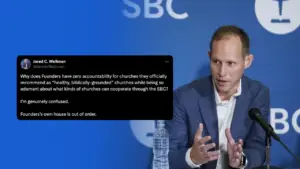Loads of bandwidth has been occupied with debate over the upcoming vote on the Great Commission Resurgence Task Force Report that will be recommended to the Southern Baptist Convention next week in Orlando. Arguments both pro and con have at times bordered on the apocalyptic. Trevin Wax has done all Southern Baptists a favor by distilling the issues involved in the debate into easily-digestible portions. As he wisely notes
GCR supporters have sometimes spoken as if this resolution will be the spark of a worldwide revival which will send renewal through the SBC. GCR detractors have sometimes spoken as if these resolutions would end the SBC as we know it and destroy all our cooperative efforts.
I recommend reading his concise analysis for balanced perspective of what is at stake and what elements in the report are proving to be the most controversial.
I intend to vote for the report because there is nothing in the recommendations that alarm me and several things that encourage me. If my enthusiasm is curbed at points it is because of what the report does not recommend. While I have read the warnings of many who fear that the proposals are too radical, to me they are not radical enough.
For example, the recommendation to increase allocations to the International Mission Board from 50% to 51% is a step in the right direction, but too tentative in my estimation. I know that some believe any greater increase would be irresponsible by virtue of the funding crises that could result for other agencies and institutions, but I think that in some cases such challenges could be extremely healthy. I am encouraged at the prospect of the Executive Committee’s budget being cut and believe that other agencies (most notably, the Ethics and Religious Liberty Commission) could do with less money for the sake of increasing our international missionary forces.
Furthermore, I am not in the least alarmed by the “Great Commission Giving” component of the report. The arguments set forth by those who fear that this will diminish Cooperative Program (CP) giving are not compelling. In fact, I find it amusing that some of the staunchest supporters of all things related to the Conservative Resurgence (CR) are employing arguments that were used against leaders of the CR. Several of those men pastored churches that gave very small percentages to the CP.
Jerry Vines recently recalled that kind of criticism and explained how he responded to it. He writes,
During the years of the Conservative Resurgence I was criticized for my church’s low percentage of giving to the SBC’s cooperative program. I just took the criticism and didn’t get mad about it (emphasis added).
That’s pretty good advice and I would encourage the current leaders of the GCR to follow it.
What encourages me most about the GCRTF report is language that it employs in it section on “Challenges.” The calls to repentance should be highlighted and given a place of preeminence in my estimation. Also, it is extremely refreshing to find language like this in that section:
- Make sure every sermon, devotion, or other type of teaching is gospel centered and driven by the inerrant and infallible text of Scripture with emphasis on how to apply the text to the lives of different kinds of people.
- Make sure every sermon, devotion, or other type of teaching clearly articulates and applies the gospel message and is centered in the grand narrative of Scripture.
The last 3 of those challenges for local churches and pastors are, in my estimation, the most significant of all.
- Reclaim the Baptist vision of regenerate church membership, recognizing that this vision is central to our Baptist identity and understanding of the church.
- Reclaim corrective church discipline as the biblical means of restoring believers to healthy discipleship and faithfulness.
- Emphasize meaningful church membership through such practices as decision counseling, believer’s baptism, new convert mentoring, membership covenants, prospective member classes, and redemptive church discipline.
The opportunity to affirm such challenges (reclaiming regenerate church membership and church discipline!) from an official task force is something that is unprecedented in modern SBC life. I will not let this opportunity be missed.
The GCRTF has received a lot of criticism, most of which is unjustified. I have appreciated the openness and humility that Chairman Ronnie Floyd and his committee have demonstrated in undertaking this herculean task. The report they are recommending is encouraging in the trajectory that is sets for the future of the SBC even more so than its specific recommendations.
I support it and encourage others to do so.




















